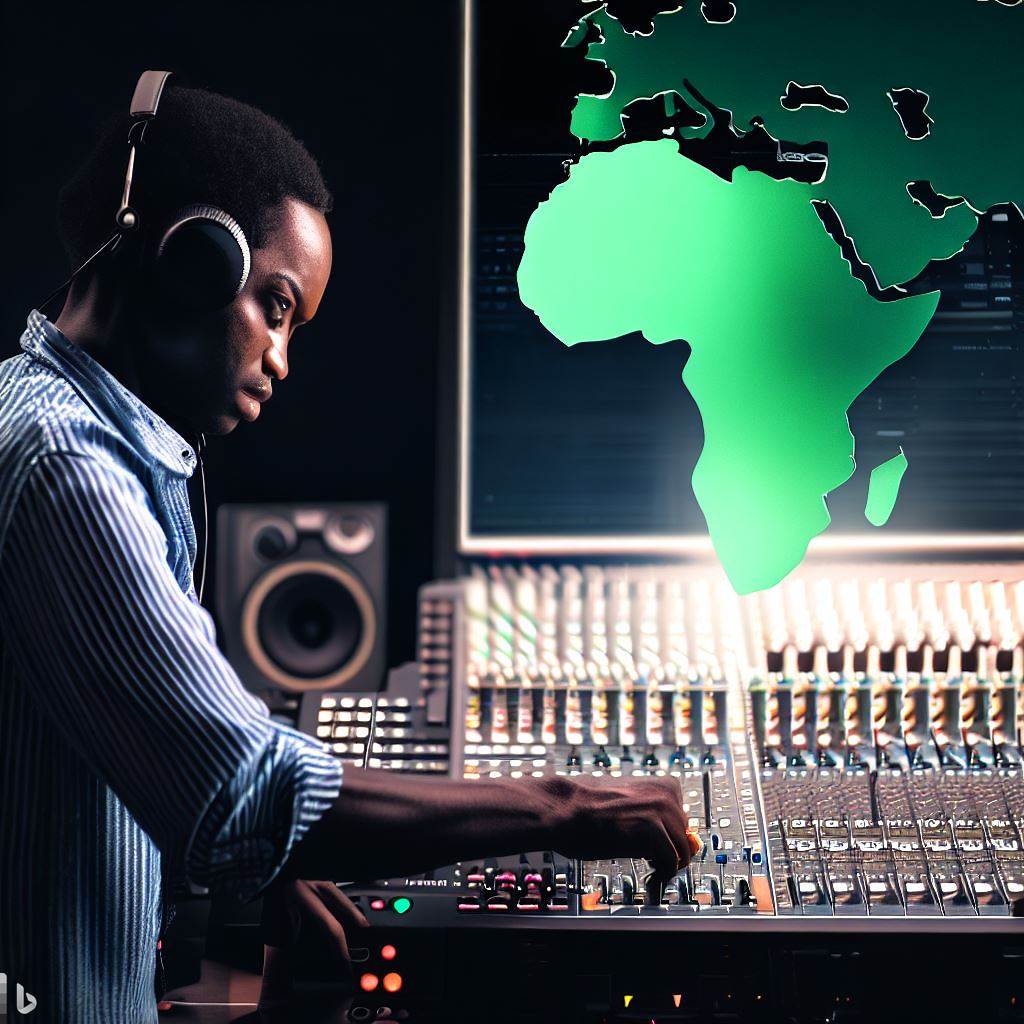Introduction
Nigeria Global Sound Editing showcases the nation’s prowess in audio manipulation and enhancement.
Sound editing is a vital aspect of filmmaking and other media forms not only in Nigeria but across the world.
Through skillful manipulation of audio elements, sound editors breathe life into visuals, creating a fully immersive experience for audiences.
From the subtle whispers to booming explosions, every sound detail has a purpose in conveying emotions, setting the mood, and driving the narrative forward.
The influence of sound editing extends beyond borders. Across the globe, sound editors have pushed creative boundaries, using sound to evoke emotions and enhance storytelling.
The meticulously crafted soundscapes have become an integral part of the cinematic language and have set a high standard in the industry.
In this blog post, we delve into Nigeria’s sound editing scene and compare it to the global standard. Nigeria boasts a vibrant and rapidly growing film industry, also known as Nollywood.
However, while Nollywood has made significant strides in recent years, sound editing remains an area that requires further exploration and development.
By examining the sound editing techniques in Nigeria and comparing them to the global scene, we aim to shed light on the strengths and weaknesses of the Nigerian industry.
We will explore whether Nigerian sound editors have embraced the evolving techniques and technologies used by their global counterparts.
As well as the impacts it has on the quality of Nigerian films. Join us as we dive into the world of sound editing.
Analyze Nigeria’s position within the global context, and understand the challenges and opportunities that lie ahead for Nigerian sound editors.
Sound Editing in Nigeria
History and evolution of sound editing in Nigeria’s film industry (Nollywood)
In the early days of Nigeria’s film industry, sound editing was a neglected aspect of filmmaking.
Sound quality was often poor, with limited resources and equipment available.
As Nollywood grew, so did the importance of sound editing in enhancing the overall cinematic experience.
Filmmakers realized the power of sound in creating atmosphere, emotion, and immersing audiences in their stories.
With advancements in technology and the availability of more resources, sound editing in Nollywood started to improve.
Sound editors began to play a crucial role in shaping the final product of Nigerian films.
Challenges faced by Nigerian sound editors
1. Limited resources and funding
- Nigerian sound editors often face financial constraints and lack access to state-of-the-art equipment.
- This limits their ability to deliver high-quality sound editing in their films.
2. Lack of training and education opportunities
- Many Nigerian sound editors have not received formal training or education in sound editing.
- This hinders their ability to fully explore and utilize the potential of sound in their work.
3. Technological limitations
- Outdated technology and a lack of software and hardware tools pose challenges for Nigerian sound editors.
- They often have to make do with limited options, impacting the quality of the final sound mix.
Notable Nigerian sound editors and their contributions
Award-winning sound editors or filmmakers
- One notable Nigerian sound editor is Kayode Giwa, who won the Africa Magic Viewers Choice Award for Best Sound Editor.
- Giwa’s work on numerous Nollywood films showcases his exceptional talent and creativity.
- Another prominent sound editor is Mike Anyanwu, who has received critical acclaim for his work in Nigerian cinema.
- Anyanwu’s attention to detail and dedication to improving sound quality have made him highly sought after in the industry.
Sound editing is a vital component of filmmaking that often goes unnoticed but greatly enhances the viewer’s experience.
In Nigeria, sound editors face numerous challenges, including limited resources, lack of training, and technological limitations.
Nevertheless, the contributions of talented Nigerian sound editors like Kayode Giwa and Mike Anyanwu cannot be overlooked.
Their commitment to their craft has significantly elevated the quality of sound editing in Nigerian films.
As Nigeria’s film industry continues to grow and evolve, it is essential to recognize the importance of sound editing.
Investing in training, education, and providing sound editors with the necessary resources can further improve the industry.
In short, sound editing in Nigeria’s film industry has come a long way, but there is still room for improvement.
By addressing the challenges faced by sound editors and celebrating their contributions, Nigerian cinema can reach new heights in sound quality.
Read: Budgeting for Sound Editing in Nigerian Film Industry
Global Sound Editing Standards
Overview of sound editing in the international film industry
- Sound editing plays a crucial role in the international film industry, enhancing the overall cinematic experience.
- It involves manipulating and enhancing audio elements such as dialogues, background sounds, and special effects.
- Sound editors work closely with directors and other professionals to create a seamless and immersive audio environment.
High standards and expectations in Hollywood and other prominent film industries
- Hollywood sets the benchmark for sound editing, with its high production values and cutting-edge technology.
- Prominent film industries worldwide, like Bollywood and the British film industry, also emphasize high-quality sound editing.
- These industries demand exceptional attention to detail, clarity, and precision in sound design and mixing.
Importance of sound editing in enhancing storytelling and immersion
- Sound editing significantly contributes to storytelling by creating mood, atmosphere, and emotional impact.
- Dialogue editing ensures clarity and seamless synchronization of characters’ voices with on-screen actions.
- Background sound effects and ambience help transport audiences to different locations and enhance realism.
- Skillful sound editing can intensify suspense, evoke emotions, and create a more memorable viewing experience.
Sound editing in the global film industry is governed by high standards and expectations, particularly in Hollywood and other prominent film industries.
The art of manipulating and enhancing audio elements plays a crucial role in storytelling and audience immersion.
Advancements and innovations in sound editing techniques continue to push the boundaries of audio experiences.
As the international film industry evolves, sound editing remains an indispensable aspect of creating compelling cinematic experiences globally.
Read: Impact of Digital Revolution on Sound Editing in Nigeria

Differences and Similarities: Nigeria vs. Global Scene
Compare the quality of sound editing in Nigerian films to global standards
In comparing sound editing in Nigeria to the global scene, it is clear that there are notable differences in quality and technical expertise.
- Nigerian films often lack the same level of sophistication and technical expertise seen in global productions.
- The sound editing in Nigerian films can be inconsistent and sometimes poorly executed.
- Global standards prioritize clear and immersive audio experiences, with attention to every detail.
Unique or distinct approaches used in Nigerian sound editing
- Despite challenges, Nigerian sound editors often exhibit creativity and resourcefulness in their work.
- They use a combination of original sound recordings, foley effects, and music to enhance the overall experience.
- Nigerian sound editors rely heavily on cultural references and local elements to create an authentic feel.
Similarities or shared techniques between Nigeria and the global scene
- Both Nigerian and global sound editors understand the importance of balance and mixing in creating a compelling audio experience.
- They both aim to capture the intended emotions and nuances of a scene through sound.
- Automated dialogue replacement (ADR) is widely used in both Nigerian and global cinema to improve audio quality.
This technique allows for the replacement of dialogue in post-production, ensuring clear and crisp sound even in challenging recording conditions.
In essence, while there may be disparities in the quality of sound editing between Nigeria and the global scene, Nigerian sound editors showcase their creativity and resourcefulness.
They bring a unique perspective to the craft, relying on cultural references and local elements to create an authentic experience.
Despite differences, there are also shared techniques and approaches that contribute to delivering compelling audio experiences in both Nigerian and global cinema.
Read: Emerging Trends in Sound Editing in Nigeria
Steps to Improve Sound Editing in Nigeria
Challenges faced by Nigerian sound editors and their solutions
- Limited access to advanced sound editing software and equipment.
Solution: Government and private sector investment in sound editing technology. - Inadequate training and skill development opportunities for sound editors.
Solution: Establish specialized training programs and workshops for sound editing. - Lack of recognition and appreciation for the importance of sound editing in films.
Solution: Collaborate with filmmakers and producers to educate them about sound editing’s significance.
Encourage collaborations and knowledge sharing between Nigerian and international sound editors
- Promote networking events and conferences that bring Nigerian and international sound editors together.
- Create online platforms for knowledge exchange and collaboration among sound editing professionals.
- Organize mentorship programs where experienced international sound editors guide and support Nigerian counterparts.
- Facilitate internships and work exchanges between Nigeria and other countries to enhance cross-cultural learning.
Advocate for increased support and funding for sound editing in the Nigerian film industry
- Raise awareness among policymakers and industry leaders about the critical role of sound editing.
- Urge funding agencies to allocate specific funds for sound editing projects and initiatives.
- Collaborate with film associations and organizations to lobby for government support and subsidies for sound editing.
- Establish grants and scholarships to encourage aspiring sound editors and foster innovation in the field.
By implementing these steps, Nigeria can overcome the current challenges in sound editing and elevate its position in the global scene.
Improved access to technology, training opportunities, and collaborations will foster a talented pool of sound editors who can enhance the quality of Nigerian films.
Read: The Impact of Nollywood on Sound Editing in Nigeria
Conclusion
This blog section unraveled Nigeria’s sound editing intricacies. Highlighting crucial aspects and techniques.
Essential to emphasize sound’s role in authentically conveying Nigerian tales. Sound editing’s artistic significance is undeniable.
In the world of sound editing, Nigeria holds its ground while embracing global trends. This juxtaposition allows for innovation while maintaining cultural integrity.
As sound editing techniques evolve, Nigerian professionals adapt, contributing to the international audio landscape.
- Cultural Fusion: Nigerian sound editors combine global techniques with local nuances, creating a unique sonic experience.
- Global Recognition: The Nigerian sound editing industry gains international attention, showcasing talent and creativity on a global stage.
- Collaborative Exchange: Collaborations between Nigerian and global sound editors lead to a cross-cultural exchange of expertise.
- Challenges Addressed: Nigerian sound editors address challenges by learning from global counterparts, improving industry standards.
- Cultural Preservation: While embracing global techniques, Nigerian sound editors ensure the preservation of cultural authenticity in their work.
- Emerging Talents: The Nigerian sound editing scene fosters emerging talents, contributing to a diverse and competitive industry.
- Innovation and Experimentation: The global scene influences Nigerian sound editors to explore innovative approaches and experimental techniques.
- Cross-Genre Impact: Nigerian sound editors impact various genres internationally, showcasing their versatility and skill.
The juxtaposition of Nigerian and global sound editing techniques opens doors to limitless possibilities. The future promises a harmonious blend of local and international elements, shaping the soundscape for years to come.
Challenges persist, but optimism reigns for Nigerian sound editing’s global breakthrough. Potential impact immeasurable, aspirations high.




